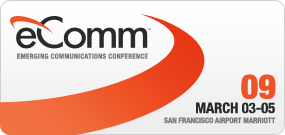
As I got on the plane heading to the iMedia Breakthrough Summit, I was greeted by none other The David Berkowitz himself! Of course the first thing I did when I got to my seat was Tweet about it (what else would I do?).
 The night's dinner was sponsored by my friends over at Jumptap (sorry you could not make it, Julie) and after the formal presentation was given, Paran Johar graced the stage and proposed a "mobile economic bailout plan" (aka a sweepstakes, where the winner gets an entire mobile campaign. Not a bad idea!)
The night's dinner was sponsored by my friends over at Jumptap (sorry you could not make it, Julie) and after the formal presentation was given, Paran Johar graced the stage and proposed a "mobile economic bailout plan" (aka a sweepstakes, where the winner gets an entire mobile campaign. Not a bad idea!)At the risk of being overly pedantic, and potentially forcing people to mince words in my presence, I want to underscore something that Paran said as he was presenting. He referred to mobile as a medium. Now, I don't know what Paran's philosophical views are on mobility, but this phrase struck me as something juicy that I could explore. Let's first define out terms.
Medium
- an intervening agency, means, or instrument by which something is conveyed or accomplished: Words are a medium of expression.
- one of the means or channels of general communication, information, or entertainment in society, as newspapers, radio, or television
It would be silly for me to add a definition of mobile; as I think we all know what I am referring to (in common parlance). The question remains,
Is the mobile phone a medium unto itself, and will it be treated as such in the marketing world in 5 five years?
I recognize the need for specialists in the mobile world today, and I love that iMedia is taking an entire day to focus on "mobile" (I would not have agreed to sit on the advisory board if I did not think this was a great initiative). Anyone who knows me, knows what my answers are to the following questions. I am not going to give my opinions at this time, rather I am looking to everyone at the iMedia summit to jump in and help out. Of course, I expect all the AMediaCirc.us/iMedia readers to jump in as well!
- What is the mobile web?
- Are there clear lines between the mobile web and what we commonly refer to as the web, necessitating dedicated, mobile web marketing teams?
- Where does the laptop fit into the mix, it is mobile?
- Along these lines, where does the netbook fit in (this is for my hardcore geeks)?
Help me turn this post into something of value by giving your answers and generating convesation. If you are not with us at the iMedia Summit and have some additional questions, please enter them in the comments. I will try to bring them up.
Related articles by Zemanta
- It's Big. It's Very, Very Big! Did I Say It Was Big? (mobhappy.com)
- News Readership Increases on Mobile Phones (drinkingoatmealstout.com)
- Movie Store launched by Samsung Mobile (phonemag.com)
- big screen, small screen, two small screens. Beyond copying the web to mobile (sociallyminded.co.uk)
- Really fast Twitter growth (socialmediatoday.com)
![Reblog this post [with Zemanta]](http://img.zemanta.com/reblog_b.png?x-id=88b34783-2b7f-4a83-b9fc-0f1cfc73418b)
![Reblog this post [with Zemanta]](http://img.zemanta.com/reblog_b.png?x-id=d37d7ee9-2fa9-4558-a9ce-6fddd555ec8c)

![Reblog this post [with Zemanta]](http://img.zemanta.com/reblog_b.png?x-id=0424387e-476f-483a-bfdc-21516edbdcbc)





![Reblog this post [with Zemanta]](http://img.zemanta.com/reblog_b.png?x-id=1acc45d5-ccd2-40cb-b565-54620644b5dd)


![Reblog this post [with Zemanta]](http://img.zemanta.com/reblog_b.png?x-id=261c8cc0-8cd9-476e-b7f9-f0c426d705ba)


![Reblog this post [with Zemanta]](http://img.zemanta.com/reblog_b.png?x-id=5652db53-36d2-4647-97ad-68db9a947622)

![Reblog this post [with Zemanta]](http://img.zemanta.com/reblog_b.png?x-id=935d9100-edfb-4ce1-a332-25c3eaba8f04)




![Reblog this post [with Zemanta]](http://img.zemanta.com/reblog_b.png?x-id=2d1be3bd-c208-4716-8b87-f50b1deb1acb)
![Reblog this post [with Zemanta]](http://img.zemanta.com/reblog_b.png?x-id=97471868-8bc6-4c9c-876c-7224a519e812)

![Reblog this post [with Zemanta]](http://img.zemanta.com/reblog_b.png?x-id=3d239ece-3e95-4b0a-bc17-4e5bd1fcaec3)


![Reblog this post [with Zemanta]](http://img.zemanta.com/reblog_b.png?x-id=50d8902d-66a2-4a94-baf6-84921fd6ccb0)
![Reblog this post [with Zemanta]](http://img.zemanta.com/reblog_b.png?x-id=9711e43d-70a2-4693-b91a-b0e6fc6fa58f)

![Reblog this post [with Zemanta]](http://img.zemanta.com/reblog_b.png?x-id=f3de498c-f45a-4241-abe9-9c1eabb0bd00)

![Reblog this post [with Zemanta]](http://img.zemanta.com/reblog_b.png?x-id=c22bc502-ebad-4b17-bee9-332e647d7d5f)


![Reblog this post [with Zemanta]](http://img.zemanta.com/reblog_b.png?x-id=f9d66f1f-26cd-4b92-b14c-21bb2b6a1696)
![Reblog this post [with Zemanta]](http://img.zemanta.com/reblog_b.png?x-id=0d459515-77c8-4895-921d-07ecbafb0e38)

![Reblog this post [with Zemanta]](http://img.zemanta.com/reblog_b.png?x-id=a0ba696d-4554-456a-976a-4bb86a1e79c5)

![Reblog this post [with Zemanta]](http://img.zemanta.com/reblog_b.png?x-id=9c593f26-54b5-4666-b87e-f934baea496b)
